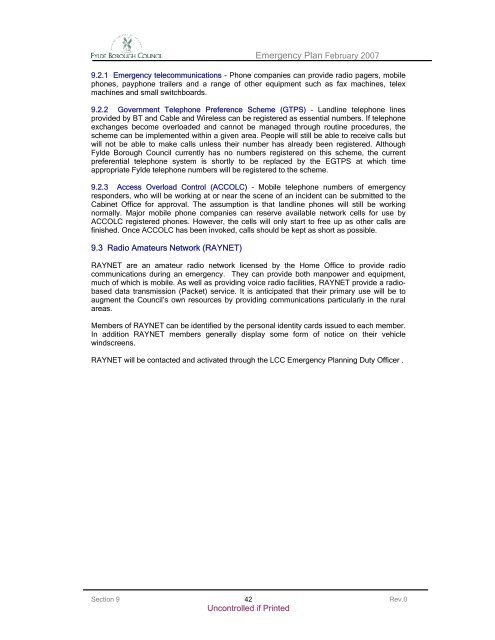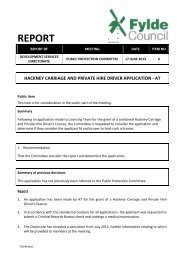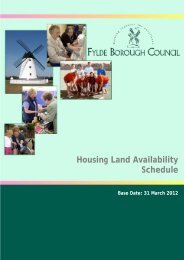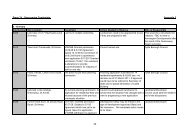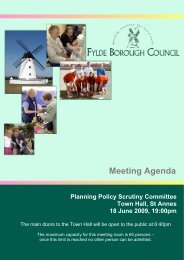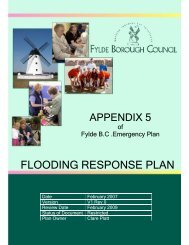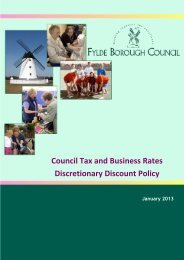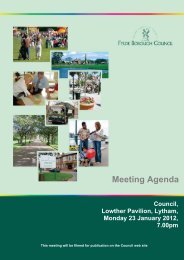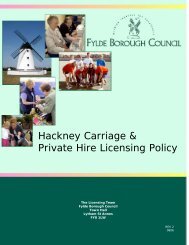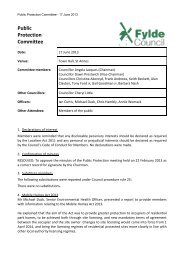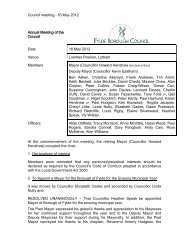Emergency Plan - Fylde Borough Council
Emergency Plan - Fylde Borough Council
Emergency Plan - Fylde Borough Council
Create successful ePaper yourself
Turn your PDF publications into a flip-book with our unique Google optimized e-Paper software.
<strong>Emergency</strong> <strong>Plan</strong> February 2007<br />
9.2.1 <strong>Emergency</strong> telecommunications - Phone companies can provide radio pagers, mobile<br />
phones, payphone trailers and a range of other equipment such as fax machines, telex<br />
machines and small switchboards.<br />
9.2.2 Government Telephone Preference Scheme (GTPS) – Landline telephone lines<br />
provided by BT and Cable and Wireless can be registered as essential numbers. If telephone<br />
exchanges become overloaded and cannot be managed through routine procedures, the<br />
scheme can be implemented within a given area. People will still be able to receive calls but<br />
will not be able to make calls unless their number has already been registered. Although<br />
<strong>Fylde</strong> <strong>Borough</strong> <strong>Council</strong> currently has no numbers registered on this scheme, the current<br />
preferential telephone system is shortly to be replaced by the EGTPS at which time<br />
appropriate <strong>Fylde</strong> telephone numbers will be registered to the scheme.<br />
9.2.3 Access Overload Control (ACCOLC) – Mobile telephone numbers of emergency<br />
responders, who will be working at or near the scene of an incident can be submitted to the<br />
Cabinet Office for approval. The assumption is that landline phones will still be working<br />
normally. Major mobile phone companies can reserve available network cells for use by<br />
ACCOLC registered phones. However, the cells will only start to free up as other calls are<br />
finished. Once ACCOLC has been invoked, calls should be kept as short as possible.<br />
9.3 Radio Amateurs Network (RAYNET)<br />
RAYNET are an amateur radio network licensed by the Home Office to provide radio<br />
communications during an emergency. They can provide both manpower and equipment,<br />
much of which is mobile. As well as providing voice radio facilities, RAYNET provide a radiobased<br />
data transmission (Packet) service. It is anticipated that their primary use will be to<br />
augment the <strong>Council</strong>’s own resources by providing communications particularly in the rural<br />
areas.<br />
Members of RAYNET can be identified by the personal identity cards issued to each member.<br />
In addition RAYNET members generally display some form of notice on their vehicle<br />
windscreens.<br />
RAYNET will be contacted and activated through the LCC <strong>Emergency</strong> <strong>Plan</strong>ning Duty Officer .<br />
Section 9<br />
42<br />
Uncontrolled if Printed<br />
Rev.0


